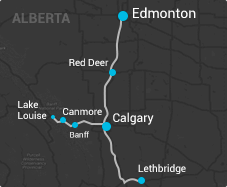Where to See Wildlife Near Calgary, Canmore and Banff National Park
by ampmlimo, on Jul 16, 2020 1:47:24 PM
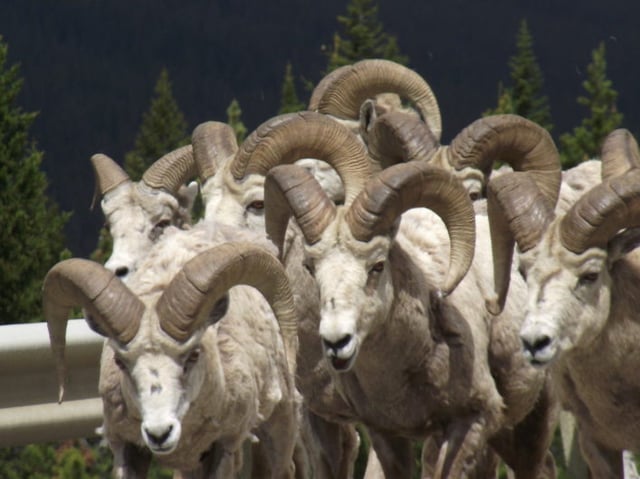
People travel from all over the world to visit the Rocky Mountains to enjoy the majestic sites of nature. Banff National Park is a very popular location, but there is much more to the Alberta Rockies! Many people drive right passed Kananaskis Country and miss the amazing views and wildlife it has to offer.
A good day in Kananaskis Country at the right time, (dawn or dusk) with the right weather, preferably damp/wet/raining, can be like driving through a living wildlife zoo.
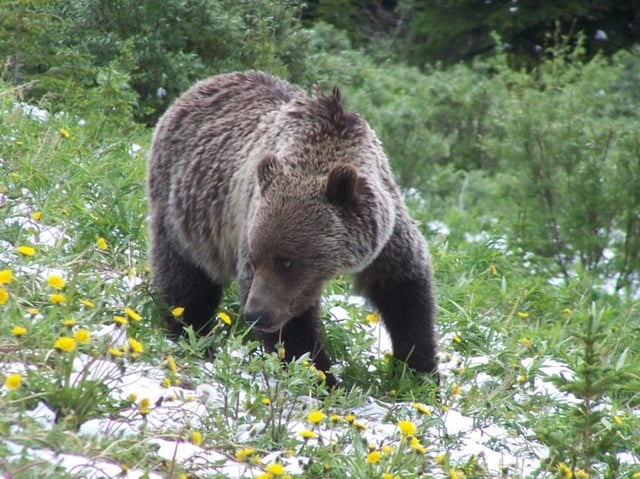
You might come across a moose, head-down in a large puddle or small pond. Maybe a pre-occupied Grizzly bear munching on dandelions on the side of the road. Deer appear and disappear, while the Rocky Mountain sheep have no problem taking up a section of the highway for the best salt patches.
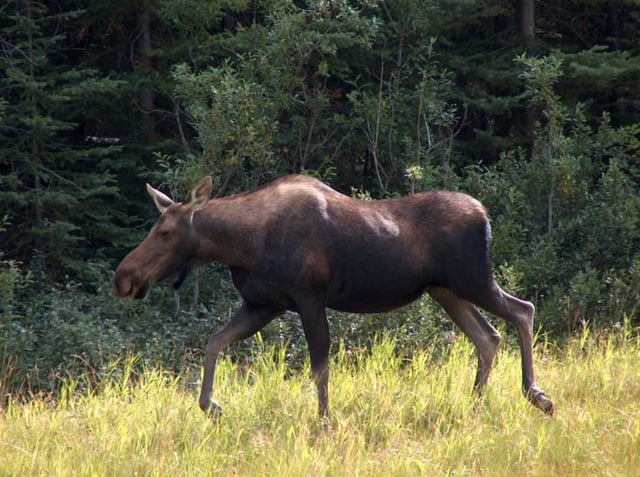
What Kind of Wildlife in Kananaskis Country
The deep forests, valleys, and hills of Kananaskis Country are home to an abundance of western Canada’s most legendary wildlife.
Grizzly and black bears,
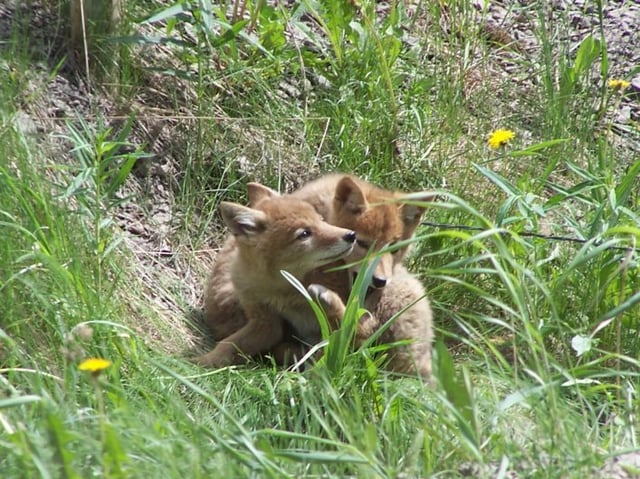
Best Viewing of Wildlife in Kananaskis
Best Viewing of Wildlife in Kananaskis really depends on the time of year and the time of day. If you’re hoping to see a Grizzly bear, odds are it won’t be during winter hibernation. Yet, in those same winter months, moose, lynx, wolves, deer, and other wildlife continue to be out and about.
Even in the midst of the cold winter season, there is still a variety of life to be seen and photographed. Grizzly and black bears are a rare sight during the depths of winter, but some do buck-the-trend, so to speak.
Hot Summer Days Are Not a Favourite For Most Forest Animals
The heat of a hot summer day simply drains too much energy from many of the larger animals of Kananaskis Country. It is less likely you will see any wildlife from your vehicle on such days.
It may be the best time to view the beauty of K-Country itself, but waiting and planning a dawn or dusk trip, in spring/summer/fall, is still best for possible sightings, especially from the comfort of a vehicle.
Let’s Talk Animal Specifics
Grizzly and Black bears
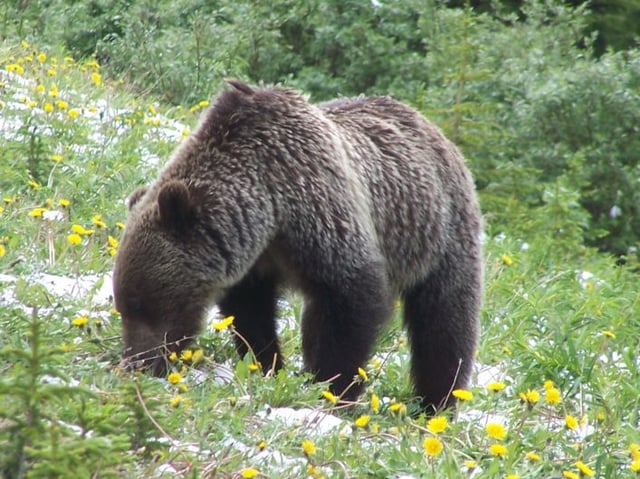
Grizzly and Black bears do hibernate from late fall/early winter to late winter/early spring in Alberta. When these animals come out of hibernation in the spring, is one of the most dangerous times for interaction.
There can even be cubs along with mom, and all are very hungry. Bears do not hunt humans. Bears do not like running into humans. Keep distance with your camera or binoculars.
The best viewing time of the season can be anywhere from spring to early winter. The best chance at seeing a live bear is at or shortly after dawn and/or leading into dusk.
Differences between a Grizzly and a Black bear:
Grizzly Bear weight, 200 – 880 lbs./100 – 400 kg
Black Bear weight, 100 – 400 lbs./45-200 kg
Grizzly has huge humps near the shoulders, the Black bear has no hump.
Grizzly paw-mark has a deep claw-impression on the ground.
Black bear paw-mark, distinguished by the curved line made by front toes, or very little imprint of the front toes.
Grizzly bears prefer the open range while the Black bear prefers a little more forest coverage.
*Springtime, after hibernation, is when bears are most dangerous as a whole.
These are preferences by the bears, but they will go to where the food source is.
Elk (Wapiti)
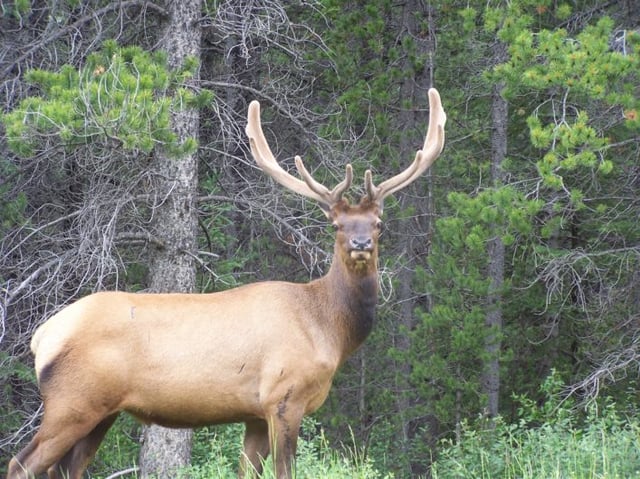
Elk (Wapiti) – Elk are found throughout Alberta in the wild and in the many Elk farms as well. These beautiful animals are in the wild in K-Country and can weigh up to 1,000 pounds. They are most ‘dangerous’ during the rutting-season in late August to October.
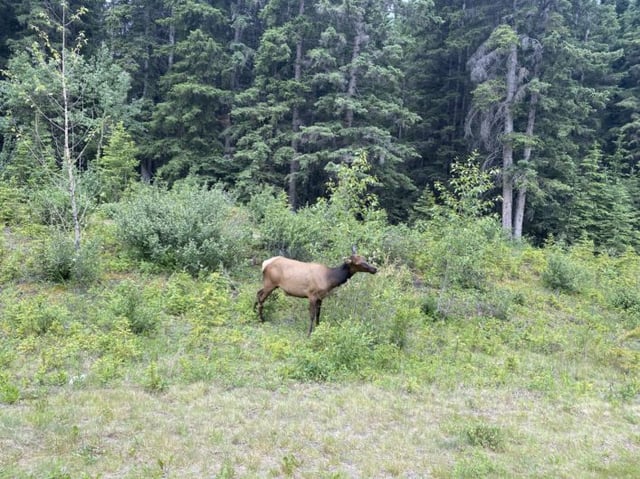
Moose
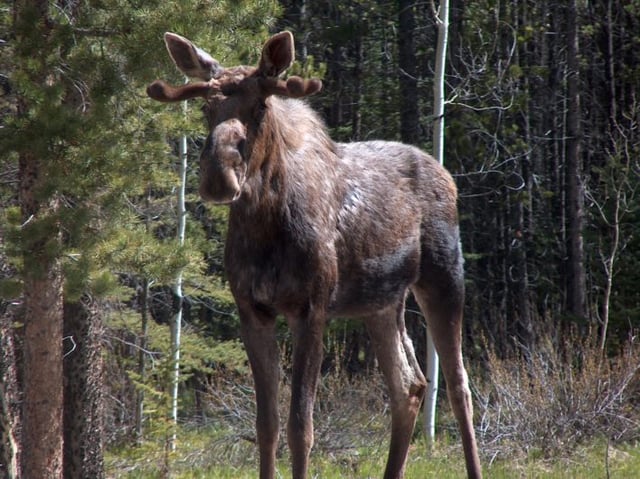
Moose – Largest member of the deer sub-family. Most deer have pronged antlers, whereas moose have a broad, open-handed-shaped antler.
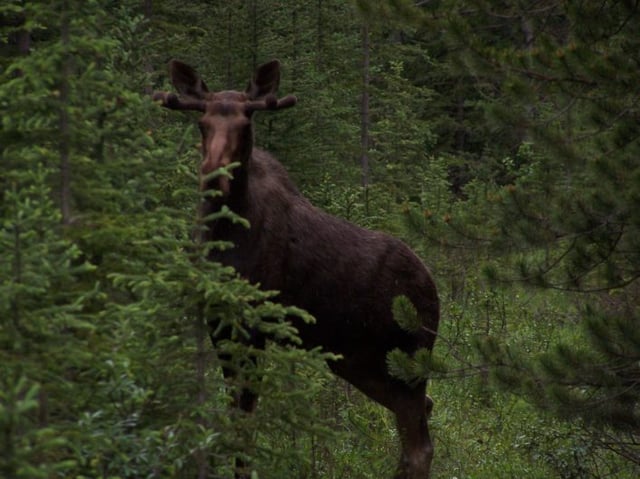
These majestic animals can weigh in between 750 – 1,000 pounds. Late summer, early fall is rutting season. They may look docile, but they are big and fast. Best to keep your distance.
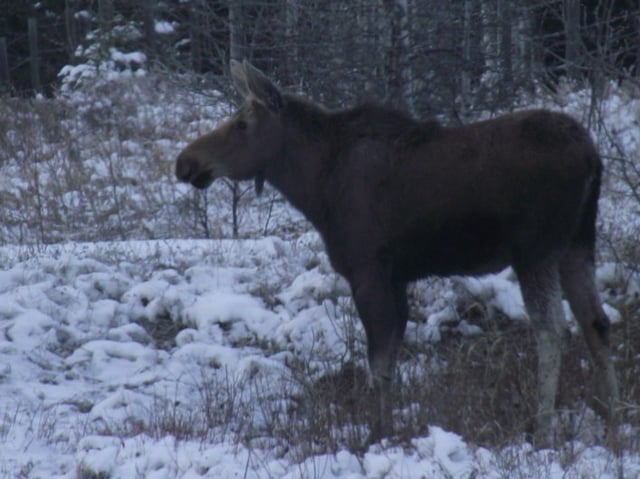
Bighorn Sheep and Mountain Goats
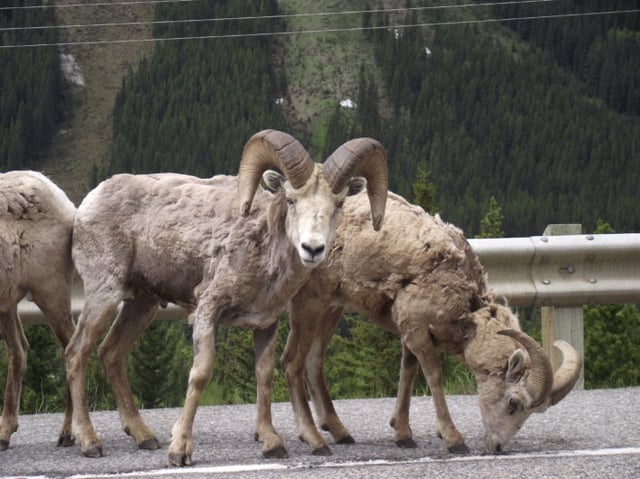
The easiest way to spot the difference between the Rocky Mountain Goat and the Rocky Mountain Bighorn Sheep is by color and horns.
Bighorn Sheep are a tan or grey color.
The Mountain Goat is white.
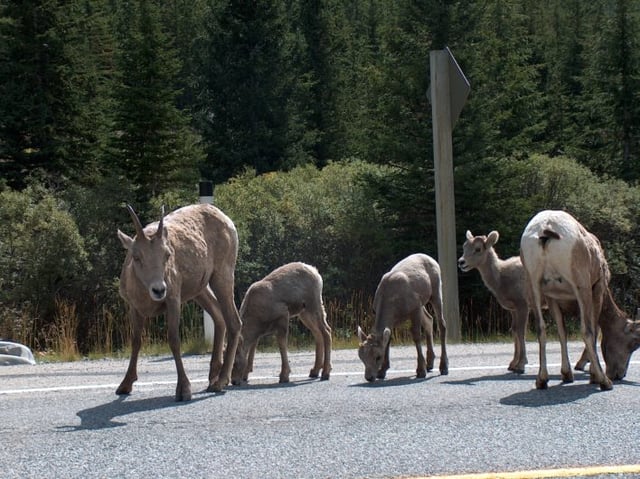
A Bighorn Sheep Ram horns are easy to identify with the full-curl of his horns. The female Bighorn Sheep has small half-curled horns and she is smaller than the Ram. Both the female and males horns are similar in their body color.
Mountain Goats horns are straight and black, for both males and females.
These two animals share much of the same terrain throughout the Rockies and tend to keep out of each other’s way. Not that the mountain sheep can’t climb steep cliffs, you are more likely though to spot the mountain goat as the one who ventures to the very edges of a straight-faced cliff, licking the saline-solutions seeping out of the rock.
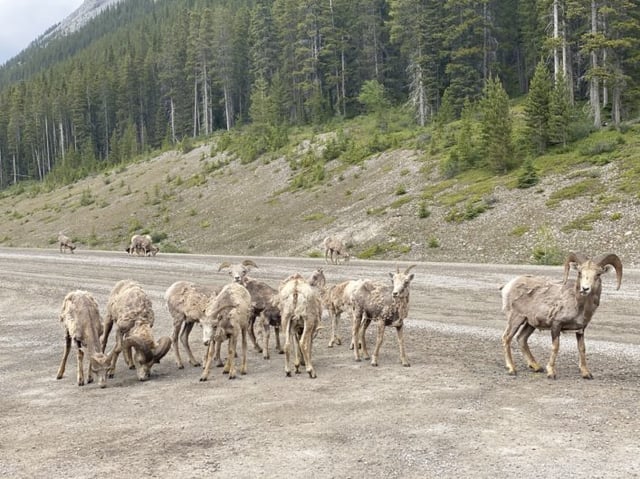
They need the minerals and protein found in salt and find an abundance in the rocks and on the highways after the winter treatments for snow and ice.
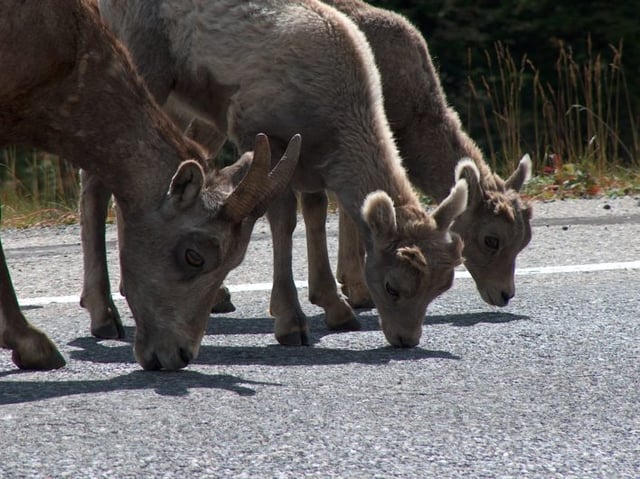
You are bound to see more Bighorn Sheep on your travels than Mountain Goats. They both can be seen dining out on the highways, but it’s more likely to find the goats on the side of a cliff – of which there are many opportunities along the way to see in K-Country.
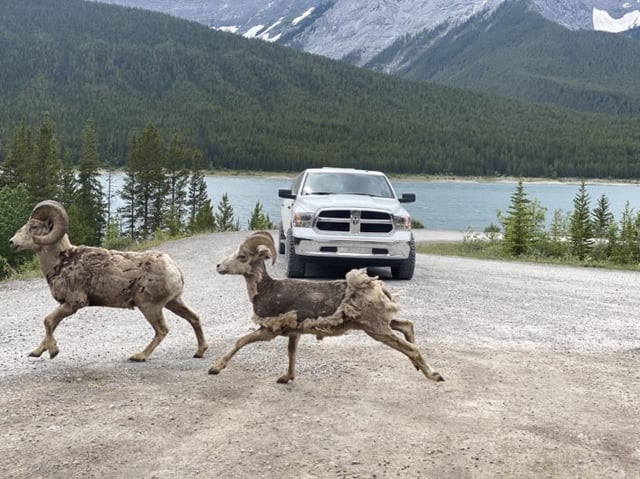
How To Get To Kananaskis Country When Driving
With no public transportation in K-Country, the most convenient and enjoyable way is to drive yourself, using a car, truck, SUV, motorcycle, or RV.
Highway 40 south from the TransCanada Highway is the starting line for most people making this drive.
The Stoney Nakoda Hotel & Casino exit off the TransCanada is a visual reminder of where to turn south on Highway 40.
From Calgary to Hwy 40 South is 75 km or a 50-minute drive west on the TransCanada Highway.
From Canmore to Hwy 40 South, head east 31km.
From Banff to Hwy 40 South, head east 55km.
From Lake Louise to Hwy 40, head east 110km.
Main Stopping Points Along the Way
There are many, many opportunities to stop and enjoy Kananaskis Country on a drive, here we will be featuring some of the main stopping points along the way.
Just moments after starting south on Hwy 40 you’ll find one of the first stops along the way with Canoe Meadows Day Use Area. Above the Kananaskis River, Canoe Meadows offers the chance to see white-water rafters, riders, and kayakers taming the waters slalom-course and man-made obstacles and areas.
As is the case with most of the province-made recreation stops, there is a picnic area and hiking trails.
The Tim Horton’s Children’s Ranch is just across Hwy 40 from the Canoe Meadows entrance.
Continuing south on Hwy 40 to Barrier Lake offers lake-splashing if you dare the chill of this man-made lake of beauty. Riverside trails, picnicking and a Visitor Information Centre are also found here, and of course, the presence of Mount Baldy as the backdrop.
The University of Calgary’s Biogeosciences
Crossing Wasootch Creek
Kananaskis Village access is about 4 kilometres down from Mount Lorette. The Village was the major center for the 1988 Olympic Winter Games, as it was designed for that purpose. Today there are two hotels, restaurants, and various service shops set amongst a courtyard featuring waterfalls and trout-stocked ponds.
Wedge Pond is the next spectacular provincial stop along Hwy 40 South, not far from Kananaskis Village. Originally dug as a gravel pit for a golf-course building, today Wedge Pond is filled with mountain water and encircled by a trail with picnic spots along the way. The view south from Wedge Pond is the often-photographed Mount Hood.
(*From December 1 to June 15, here on Highway 40, the winter gates close public traffic south, to 44 km west of Longview, AB).
Peter Lougheed Provincial Park
The boundary of Peter Lougheed Provincial Park is the next point of interest, as it is the intersection of Highway 40 and Kananaskis Lakes Road.
In the six open months of Hwy 40, you would decide whether to continue down Hwy 40 S to Longview or go west on Kananaskis Lakes Road.
Continuing west along Kananaskis Lakes Road towards Upper Kananaskis Lakes is a short, beautiful stretch of road leading through camping areas and hiking trails. The intersection to Upper or Lower Kananaskis Lake access is about 5 kilometres from Hwy 40.
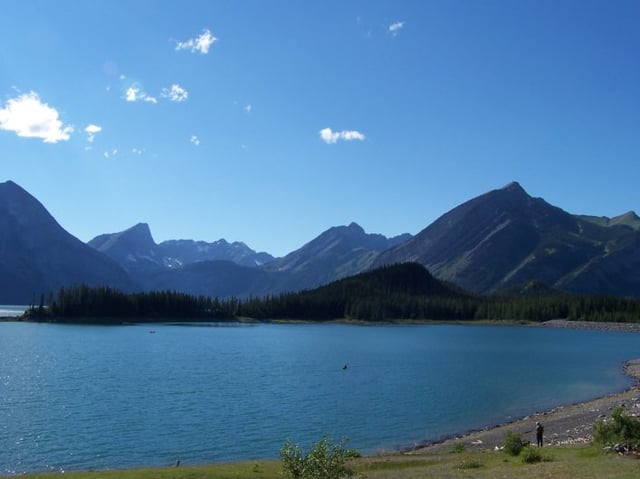
Getting between Lower and Upper Kananaskis Lakes takes mere minutes by car. The Lower lake is more of a fishing area, while the Upper lake is a more recreational area with a couple of options on viewing, picnicking, and boating access.
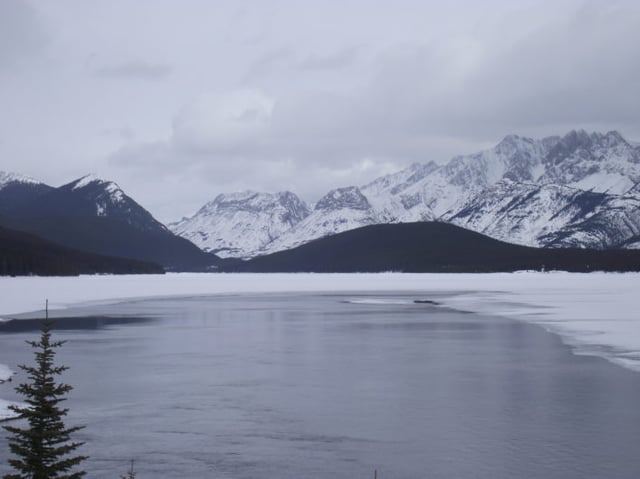
In 1858 Captain John Palliser passed through this lakes area and summed up what he saw; “We came upon a magnificent lake, hemmed in by mountains, and studded by numerous islets, very thickly wooded. This lake, about four miles long and one-and-a-half miles wide, receives water from the glacier above, and is a favourite place of resort to the Kootenai Indians”.
There Are Three Routes to Take You Back to the TransCanada Highway or Highway 22
#1 Route – Travel back to the TransCanada Highway the way you came. You would be travelling north on Hwy 40 to the TransCanada. At the TransCanada, a left-turn is west towards Canmore, a right-turn is east towards Calgary.
(The drive time from Calgary to Canmore is approximately one hour and ten minutes. The total distance from the Calgary Airport to Canmore is 120 km)
#2 Route – Continue Highway 40 South to Highwood Pass and Highway 22 at Longview
(*This section of Highway 40 South is closed off from December 1 to June 15 annually)
Following Hwy 40 South is the most forested area of the Hwy 40 S drive. It also climbs to the summit of Highwood Pass at 2,227 meters/7,310 feet.
Highwood Meadows is the highest stop on Hwy 40 S. Nestled at the tree-line, the feel of the wilderness of the Rockies is felt here and throughout the very accessible paths and trails that are strewn throughout the area.
From Highwood Pass south on Hwy 40, the highway descends into the Highwood-Cataract Creek areas of Kananaskis Country. The Highwood House General Store (opened seasonally) is located where Highway 40 South becomes Highway 541 to Longview.
At the intersection of Hwy 40 S and Highway 541 is an option to get off the main road and travel a little rougher if you dare. The gravel Highway 940 wanders west, then south, then east through the Kananaskis Rockies for a little over 60 km and brings you out at Highway 22, just north of Chain Lakes Area.
*This route would not be recommended to just day travellers. You are literally in the wilderness. These types of drives require a little more preparation.
When Highway 40 turns into Highway 541, heading south-east, you wind down, through the mountain road and experience/witness the different shelving of the mountains. From the high of the Rockies to the Foothills, to Flatlands just outside of Longview.
Approximately a 30-minute drive from the Hwy 40 and Hwy 541 intersection, to Longview.
#3 Route – Smith Dorrien Trail/
At times the road is wide with an 80 km per hour limit, other times will bring narrow portions and much less speed.
A truly enjoyable ride, when just moseying along. Camera at the ready.
Travelling up the Smith-Dorrien Watershed, the views are majestic and awe-inspiring.
Mud Lake is when you enter Spray Valley Provincial Park, just a little north of Mount Engadine Lodge.
Mount Assiniboine is hard to miss near Buller Pond, with its resemblance to the “Matterhorn” of Swiss Alps fame. Continuing north, the road parallels Spray Lake for close to twenty kilometres with lake-front picnicking and trail areas.
Goat Pond is the last body of water on the trail. You will follow the trail from Goat Pond, then it disappears for a 300-meter fall passing through three power plants, which when combined, power a city of up to 100,000 people.
From what looks like a top-of-the-world view with a lookout at the Bow Valley with the glorious Rockies all around including the Three Sisters and Mount Sparrowhawk.
Continue north on Spray Lakes Road, down into the town of Canmore.
There are many other loops to access Kananaskis Country, but this is the most common way to take in Kananaskis Country with a day drive.
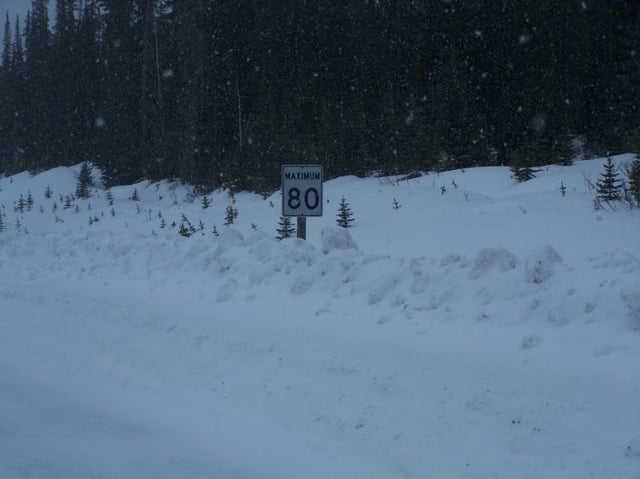
What do you need for a trip to Kananaskis Country for a day?
*Full tank of gas (or whatever fuel gets you there)
*Jacket (mountain weather can change rather quickly)
*Food/snacks and liquids
*Bug spray
*Bear Spray if you are going hiking, (and be loud when hiking trails or off-trail).
*A good camera with plenty of battery power.
Take your time driving while keeping an eye out for wildlife. Let faster vehicles by with a quick turn-signal and a slow pull-over, as it is quite a common practice.
Be vigil. Look for movement. Be safe.
Keep in your vehicle near any wildlife.
Kananaskis Country covers over 4000 square kilometres on the south-eastern slopes of Canada’s Rocky Mountains. The Rockies continue into the United States and become known for what they are, the Continental Divide.
There are 5 major divisions making up K-Country;
*Kananaskis Valley, Kananaskis Lakes, Elk Lakes & Smith-Dorrien
*Jumping Pound, West Bragg & Elbow*Ghost, Bow Valley & Spray
*Ghost, Bow Valley, Spray
*Sheep & McLean Creek
*Flat Creek, Highwood, Cataract, Willow Creek & Livingstone
Kananaskis Country Dedication took place in 1978 by then-Premier Peter Lougheed. At the same time, Peter Lougheed Provincial Park and Kananaskis Provincial Park were dedicated.
Nearly two-thirds of this multi-use area is now protected as a park, ecological reserve, or recreation area.
Accommodations in Kananaskis Country
Kananaskis Village is an ideal getaway for a weekend or a week. There are three hotels in the Village along with a pub, convenience and gift store, and a bistro.
*The world-renowned Kananaskis Country Golf Course, is located just minutes south off Highway 40, offering some of the most breathtaking golf holes in the game.
*Hotels in Kananaskis Village:
Crosswaters Resort (upscale hotel)
Mount Kidd Manor (casual hotel)
Private Tours Available
If you are visiting from out of town and you are not familiar with the area, we can arrange day trips for 2 – 30 passengers. Let our experienced drivers take you on a private tour of the area. Sightseeing from a luxury vehicle without the stress of driving and directions can make for a more relaxing and memorable experience when it comes to the best wildlife viewing in Banff, Canmore, and Calgary.
We can arrange tours in sedans, limousines and tour buses. Whatever your group size, book with AM PM Limo for an outstanding, unforgettable tour.



